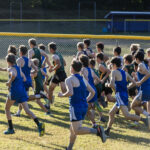Science
The Science Department at TA helps students acquire essential knowledge in the physical, life, and chemical sciences. By engaging in the authentic practice of science, students will learn about the relationships among science, technology, and human activity and how they affect the world.
Students will learn to:
- Acquire, classify, and utilize scientific knowledge;
- Understand basic scientific methods and principles;
- Understand and apply safe lab techniques;
- Demonstrate proper use and care of laboratory equipment; and;
- Be environmentally aware.
To fulfill the Science diploma requirements of Thetford Academy, a student must complete three credits of coursework from the Science Department, including Conceptual Physical Science and Biology.
SCIENCE REQUIRED COURSES
Introduction to Laboratory Science
Grade 7 | Required
This course introduces students to laboratory science through a variety of subjects and experiences. Students will have an opportunity to design experiments, complete engineering and design challenges, collect and record data, interpret results and communicate findings using scientific writing. Students will engage in units that cover topics related to matter and its interactions, meteorology, climate change and human impact on our environment, Genetics, human body systems and cell structure and function. This course will use our outdoor resources for the purpose of learning as much as possible.
The Flow of Matter and Energy through the Biosphere
Grade 8 | Required
This course examines the transfer of matter and energy through ecosystems, both in the field and in the laboratory. Students explore the ecological structure and composition of a nearby forest and pond ecosystem and delve into the complex dynamics of the biotic and abiotic world, including food webs, nutrient cycles, and species interactions. The physical earth section explores rocks and minerals, the processes that shape the planet, and the geologic history of the earth. Students examine the physical aspects of energy and matter transfer, and the topics of magnetism, electricity, and the nature of light. Finally, students will study botany, focusing on plant parts and their functions.
Conceptual Physical Science
Grade 9 (Required) | Credit: 1
This course is a laboratory-based introduction to the physical sciences with an emphasis on proper laboratory safety and procedures. Topics in physics and chemistry include motion, energy, force, work, heat and states of matter, as well as the structure of the atom, chemical bonding, and the periodic table of elements. This course also includes a unit on astronomy, giving students the opportunity to better understand the Earth’s (and their own) place in the universe. In addition to individual and group research projects and labs, students are challenged to complete engineering design projects. This course includes an embedded honors option.
Essentials of Biology
Grade 10 (Required) | Credit: 1
Are viruses alive? If human mass is mostly bacterial cells, who is running the show? If the mushroom on the forest floor is not a fungus organism, what is? This introductory course answers these and other questions and helps students relate modern biology to our ever-changing world. Topics of study include ecology, cell biology, biochemistry, genetics, evolution, and classification. The course includes a variety of labs and hands- on field explorations designed to further understanding of the scientific method.
SCIENCE ELECTIVE COURSES
Astronomy
Grade 10–12 | Credit: 1/2
What makes a star shine? How long will the sun keep shining? What are black holes and how can they form? Astronomy is a general introduction to contemporary astronomy that includes how stars form and how they end their existence. The course gives special attention to the historical roots of astronomy and the exciting discoveries of the past few years. Students learn how pulsars and black holes result from the evolution of normal, massive stars, and how Black Holes are at the center of galaxies and quasars. Astronomy students explore the solar system and constellations and learn to find their way around the sky. In labs, students explore concepts discussed in class.
Advanced Biology—Honors Course
Grade 11–12 | Credit: 1
Advanced Biology immerses students in study of the biological processes that control and regulate all life. Looking at DNA as life’s “blueprint,” students explore DNA’s role and use as a delivery device for the biological information that drives evolution, as well as its role in medicine, industry, and forensic science. Students engage in a series of labs and independent projects to prepare themselves for college-level work in science, biology, or a health-related field of study.
Prerequisite: Essentials of Biology or permission of the instructor.
Food Science
Grade 9–12 | Credit: ½ or 1
The Food Science course uses common food ingredients to explore scientific concepts. Throughout the course, students will participate in laboratory-food experiments, using the scientific method to explore science concepts. Cooking offers ample opportunities to investigate chemical and physical changes, acid and base reactions, phase changes, heat transfer and more. For example, jams, pickles, beef jerky, ice cream, bread and candy all offer a platform to study science. Lab reports, including observations, data, calculations and conclusions allow students to reflect on scientific concepts while developing critical thinking and reporting skills. After successfully completing Food Science students will have an introductory understanding of basic chemistry.
Chemistry I: The Study of Matter
Grade 11–12 | Credit: 1
Chemistry is the study of matter and its changes. In this class, students learn how all matter in the known universe is simply a combination of 92 fundamental elements and how they themselves, and all that sustains them, are made of those elements. To understand this, students study the building blocks of matter, how humans have come to understand them, and how science may be harnessed to predict their interactions and create new forms of matter. Chemistry is a compelling tale about how humans have come to make sense of the natural world. This course provides students with the language, information and ideas needed to understand that story, which is still being written.
Prerequisite: Essentials of Biology (concurrent enrollment permitted) and Algebra I.
Advanced Chemistry—Honors Course
Grade 11–12 | Credit: 1
Students delve into the part of chemistry involving calculating amounts—how much solid is produced? How much heat is given off? Students learn to write chemical formulas and reactions, examine reactions of gases, analyze how fast reactions proceed and look at a special class of reactions that go forward and backward at the same time. Advanced Chemistry is the essential next step for those students who wish to take a Chemistry course in college for a career in medicine or another STEM field. This course, along with Chemistry I, is a good preparation for the SAT II test in chemistry.
Prerequisite:Chemistry I with a grade of B or better. (Algebra II and other ongoing preparation in mathematics are recommended.)
Anatomy and Physiology
Grade 11–12 | Credit: 1
The human body is a finely tuned, resilient, and adaptive machine. Anatomy and Physiology is an exploration of the inner workings of the body in health and disease. By exploring the healthy function of organ systems, students learn how and why things go wrong—that is, when illness or injury occurs. This course covers organ systems including the Circulatory/ Respiratory, Digestive, Musculoskeletal, Integumentary, Nervous, Endocrine, Reproductive, and Immune, with a focus on understanding how the various systems work together to maintain homeostasis.
Environmental Science: Global Concerns/Local Impacts
Grade 11-12|Credit: 1
Environmental degradation on a local, state, and global level may be among the most serious crises of our times. This course on a nearby ecosystem-the Zebedee Wetland-broadens student understanding of limnology (fresh water aquatics), soil biology, air quality, biotic and abiotic factors in these ecosystems, as well as the impacts of human activity and development on watershed ecosystems. Students engage in on-site data collection to analyze and assess the current health of the wetlands. Topics covered include terrestrial and freshwater ecosystems, air quality and pollution, geology, biochemistry of soils, and current global issues.
Marine Biology
Grade 11-12|Credit: 1
The oceans contain some of Earth’s most beloved creatures along with some great alien mysteries. The blue whale may be the largest animal to have ever existed on Earth, yet it is the tiny plankton that make the greatest mass migration of any organism on land or sea. This course covers the biology of organisms in various marine habitats as well as the abiotic (non-living) factors that define those habitats. Along the way, the class will learn about the international laws governing marine management and explore a variety of conservation issues.
ZOOBOT! – The Lives of Animals and Plants
Grades 11-12 | Credit: 1/2 or 1
Zoobot! is a combination of two half-block courses: botany (the biology of plants ) and zoology (the biology of the animal world). They can be taken individually for .5 credit), or together (1 science credit).
Zoology – Animals are on the move: predators hunting prey, armies conquering new territory both on land and in the water. They have survived for hundreds of millions of years. Their survival has been ensured by reproducing in a way that allows them to morph into new forms, forever adapting to a changing environment. They comprise the kingdom of Animalia, and they include all of us. That’s zoology!
Botany – Plants face the same sort of challenges that animals confront throughout their lives. In order to survive, plants too, have to move. Plants invade territory, they fight one another, and they have to compete for mates. Some plants have developed traps to capture and devour invaders from the animal world. Plants simply operate on a different time scale then animals, making it harder for us to see all this action. Through your study of botany, you will see this kingdom of plantae differently than you have ever seen it before.
The predator-prey relationships within these two worlds have maintained their balance for millions of years. That balance is now shifting due to the dominance of one species in the animal world: homo sapiens; humans. We will explore the inter-relationship between humans and the rest of the living world by reading excerpts from Amy Stewart’s Wicked Plants, and The Animal Dialogues, by Craig Childes, and by drawing from David Attenborough’s documentaries of the plant and animal kingdoms.
Forestry
Grade 11–12 | Credit: 1
In Forestry, students study the forest as a biological community, covering ecological concepts such as energy flow, forest nutrition, nutrient cycling and decomposition, and the interrelationships between trees and other organisms comprising the community. Students examine the concepts of disturbance, succession, population dynamics, biological and ecosystem diversity, and wildlife habitat management. Students also study ecologically based manipulations of forests to achieve desired management objectives; develop and apply silvicultural prescriptions to timber and non-timber forest benefits; and learn about soil, forest health, and biodiversity.
Horticulture
Grade 11–12 | Credit: 1
Horticulture is all about growing! This is an introductory course in horticulture concepts designed for the student who enjoys making and watching things grow. Horticulture covers methods and principles of organic gardening, plant growth and plant propagation. Students will also understand the proper use of fertilizer; biological control of plant pests; small fruit gardening; lawn and turf grass management; vegetable, herb, and flower gardening; and landscape design. This is a practical class that will benefit any plant enthusiast, future homeowner, or burgeoning farmer as well as the student who are curious and excited to be outside. A cooperative ‘can-do’ attitude and enthusiasm to participate in outdoor hands-on work is expected in this course.
Physics: Mechanics
Grade 11–12 | Credit: 1
If something moves, it can be studied – falling objects, wind, and water currents, rockets launching into space, or cars driving down the highway or racing around a track. Forces allow objects to start and stop moving, turn, and affect other objects. Forces acting over time and distance lead to a study of energy and how it powers all the objects in our daily lives. A good background in algebra and basic trigonometry is very helpful for this course and a willingness to apply your mathematical knowledge to scientific problems and projects.
Prerequisite: Algebra II
Physics: Waves, Light, Electricity, and Magnetism
Grade 11–12 | Credit: 1
A bobbing spring or a swinging pendulum begins a study of waves, which then leads to a study of sound, including the basics of music and musical instruments. You will then take this knowledge and apply it to a study of electrical current and circuits, magnetism, and finally thermodynamics. Laboratory assignments will emphasize experiments and projects that allow students to explore each of the topics in depth and allow them to further improve their scientific communication skills.
Prerequisite: Algebra II










